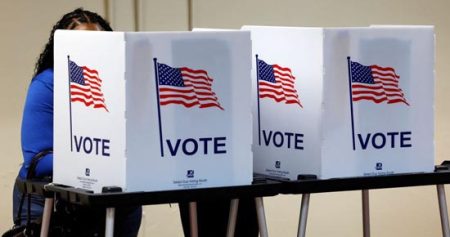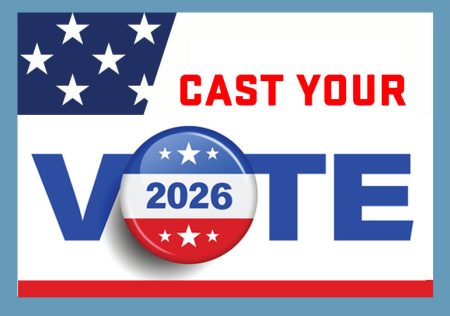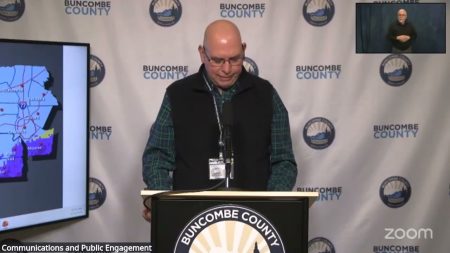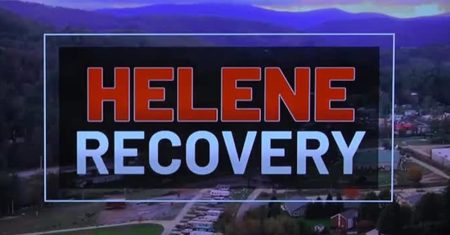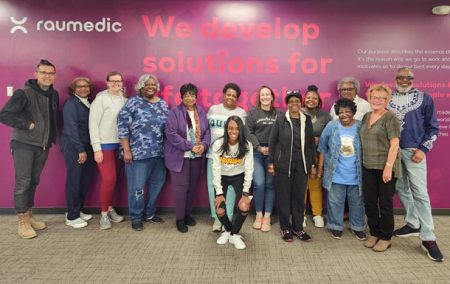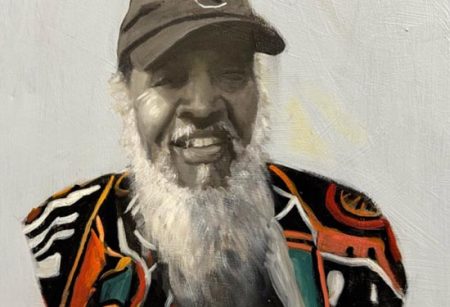Judge Not, That You Be Not Judged
Riggs announced that she will appeal the decision regarding the 65,000 voters being challenged.

Photo: Tim Barnwell
Legislative News by Nelda Holder –
Just how often do I get this chance?
First, to use that headline for one of the premiere North Carolina political stories of the season, and second—in today’s column—to just repeat verbatim the entire first section of my January 17, 2025 column (see “Curiouser and Curiouser: The Disappearing Judgeship”). That’s because three months later, Republican judicial candidate Jefferson Griffin is still contesting the election of opposing Democratic candidate Allison Riggs to the position of NC Supreme Court judge.
Most North Carolinians have surely read or heard about this—perhaps so much about it they might have stopped paying attention. But last November, the State Board of Elections declared Riggs the winner of the general election Supreme Court contest by 734 votes. That was out of a total of votes 5,540,096 cast statewide, and there was an initial count, one full recount, and a third partial recount in this contest before the declaration of a winner.

Griffin then formally protested. He wanted more than 60,000 Riggs votes declared ineligible due predominately to a missing driver’s license number and/or the last four digits of a Social Security number. And that’s where the information in our January report becomes particularly interesting. It details an intriguing little plot reported on by ProPublica’s Doug Bock Clark in the December 23rd edition (“A North Carolina Supreme Court Candidate’s Bid to Overturn His Loss Is Based on Theory Election Deniers Deemed Extreme”). Here’s the pertinent skivvy:
“Pro Publica notes that one idea discussed (in a telephone conversation between ‘election skeptics’ months before the election) was to ‘try to get the courts or state election board to throw out hundreds of thousands of ballots’ cast by individuals whose on-file voter registrations (emphasis mine) are missing a driver’s license number and/or the last four digits of a Social Security number.”
And now we have Griffin, the would-be Supreme Court judge for the state of North Carolina, following this very playbook after losing his election.
Indeed, according to ProPublica, there was even resistance to such a specious idea on the reported phone call itself, including from “the leader of the North Carolina chapter of the Election Integrity Network.” But now the would-be State Supreme Court judge seems to have taken this tricky idea and run with it.
So now we have a Supreme Court race put on further hold. It is important to offer, therefore, the reaction of the State Board of Elections in overseeing this candidate-propelled debacle. The BOE offered a statement in the wake of April 4th’s NC Court of Appeals ruling, including the following possibilities:
The court’s decision may require county boards of elections to contact voters whose registration forms did not include a driver’s license number or [the] last four digits of a Social Security number, and to allow those voters to provide that information … to ensure their votes for the Supreme Court contest count in the 2024 general election.
The court’s decision may also require the county boards … to contact military and overseas-citizen voters who used absentee ballots to provide a copy of their photo identification, to ensure their votes … count.
Importantly, the BOE noted that the “court’s decision is not yet in effect and is likely to be appealed,” adding that if the court’s decision does go into effect, instructions will be provided to affected voters on how to comply.
Riggs then announced on April 6 that she will appeal the April 4 decision regarding the 65,000 voters being challenged.
Note: The full list of challenged voters is available through the NCBOE at www.ncsbe.gov/information-voters-challenged-election-protest. Or contact your local board for additional assistance.
On Monday, April 7, the NC Supreme Court issued an order that blocks the Court of Appeals’ 15-day “cure” period for the voters in question while Riggs and the BOE appeal. Stay tuned!
[Editor’s Note: At press time the state Supreme Court—with Riggs recusing herself—had voted to put on hold the Appeals Court decision.]
Meanwhile, Inside the State House
With a lot of major issues and events swarming the legislative complex in downtown Raleigh, the august General Assembly has operated with perhaps less scrutiny than it deserved of late. Let’s take a look at some of the results.
House Bill 322; Senate Bill 242; House Bill 178 (requiring repeal of the “secrecy” state of public records inserted in the 2023 budget bill): A Democratic attempt to reverse certain “incomprehensible” (this author’s editorial term) withholding of information from the public that sailed through during the budget maneuvers, and to establish such legislative “privileges” as the following:
- Remove legislative exemption from the state’s public records law
- End secrecy in correspondence between legislators when drawing election districts
- Establish additional time for review and comment on state budget bills
- Establish public records identifying lawmakers behind specific budget provisions
- Provide more time for the public and all lawmakers to review and comment on state budget
HB 322 passed first reading and was referred to the Committee on Rules, Calendar, and Operations; SB 242 passed first reading and was referred to the Committee on Rules and Operations; HB 178 passed first reading and was referred to the Committee on Rules, Calendar, and Operations.
House Bill 674 (The Firearms Liberty Act): Passed first reading and referred to the Committee on Judiciary 2. This bill would allow issuance of a lifetime concealed handgun permit. It would allow a permittee whose permit lapses to renew without another firearms safety and training course, and would authorize (for those subject to a domestic violence protective order) storage of firearms with a licensed firearms dealer, and authorize storage and use of defensive devices in biometric safes for schools. Passed first reading; currently in Judiciary 2.
House Bill 270 (Revise Law on the Death Penalty): This stark bill would revise the state’s “methods of execution available for a person convicted of a criminal offense and sentenced to death.” Striking the current “every case” death by intravenous injection, the bill would offer have the convicted person executed by electrocution or, “at the election of the convicted person, by firing squad or lethal injection, if it is available … under the direction of the Secretary of the Department of Adult Correction. The election for death by electrocution, firing squad, or lethal injection must be made in writing 14 days before each execution date or it is waived.” Passed 1st reading; currently in Committee on Judiciary 2
>> Sign the petition urging lawmakers to reject HB127 at democracync.org.
House Bill 127 would make it a Class 2 Misdemeanor to use the official voter registration form, potentially resulting in a jail sentence of up to 60 days for those simply trying to help others participate in democracy. As a point of reference, this would put registering voters at the same level as assault and reckless driving in terms of criminalization. Criminalizing nonprofits and individuals who assist with voter registration is not only an attack on our democratic values, but it also creates an atmosphere of fear and uncertainty for those simply trying to help others exercise their freedom to vote.
Nelda Holder is the author of The Thirteenth Juror – Ferguson: A Personal Look at the Grand Jury Transcripts.

